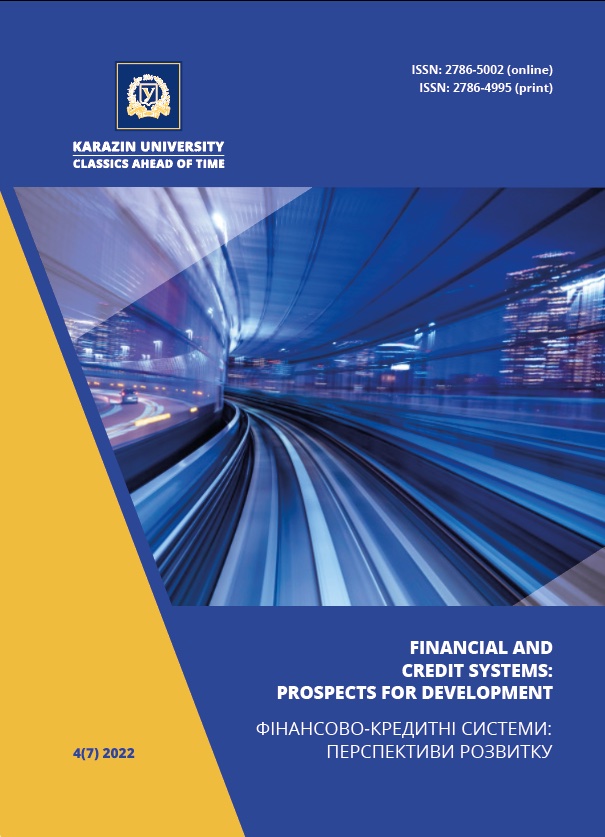STRATEGIC DIRECTIONS OF TERRITORY DEVELOPMENT IN CRISIS CONDITIONS
Abstract
The article is devoted to the analysis and generalization of the impact of crisis phenomena on the development of the regional economy, using the example of the current stage of socio-economic development of Ukraine, and the substantiation of the methodological principles and priorities of the development of the economy of the regions of the state in crisis conditions. The urgency of the problems of forming the priorities of anti-crisis management at the regional level has been proven. The principles and functions of the development of the regional economy in crisis conditions are substantiated, and the main problems that need to be solved are outlined. The regional economy can be interpreted as a system functioning in conditions of instability. In this case, the direction of the system's functioning in crisis conditions will be determined by the level and nature of threats, as well as the specifics of the internal structure of such a system and the stability of its individual components. Four priorities of the post-crisis development of regional socio-economic systems of Ukraine are summarized - guaranteeing security; quick recovery of business activity; preservation of horizontal connections between subjects of economic activity and components of economic systems at different levels; diversification of economic activity in the context of implementing the provisions of sustainable development and taking into account the priority of security. The concept of economic security of the state based on innovative sustainable development of regions is considered as the basis of the paradigm of modern anti-crisis management of the country's economy. The need to develop a unified state strategy based on the use of the provisions of the theory of security and the theory of crises, the principles of harmonious and innovative development of regions in the conditions of technoglobalism is substantiated.
Downloads
References
Leys, C. (1996). The crisis in "development theory". New Political Economy, 1, 41–58.
Penuel K., Statler M., Hagen R. (2013). Encyclopedia of crisis management. SAGE Publications, Inc., Thousand Oaks, Calif [in English].
Klymenko, O. M. (2012). Teoretychni aspekty antykryzovoho upravlinnia rehionom [Theoretical aspects of anti-crisis management of the region]. Naukovi pratsi NDFI, 4, 70–72 [in Ukrainian].
Redziuk, E.V. (2021). Ekonomichna yevrointehratsiia: otsinka y modeliuvannia poverkhnevykh ta prykhovanykh chynnykiv dyverhentsii mizh Ukrainoiu ta YeS [Economic European integration: assessment and modeling of surface and hidden factors of divergence between Ukraine and the EU]. Mizhnarodna ekonomichna polityka, 1 (34), 95-118 [in Ukrainian].
Redziuk, E.V. (2021). Finansovo-ekonomichni mekhanizmy ta instrumenty vplyvu na svitohospodarski protsesy [Financial and economic mechanisms and tools of influence on global economic processes]. Naukovi pratsi NDFI, 4, 34-47 [in Ukrainian].
Smochko, N. M. (2019). Monorozvytok terytorii u suchasnomu heoprostori: teoriia ta metodolohiia [Monodevelopment of territories in modern geospace: theory and methodology]. Lviv : Vydavnytstvo NNVK «ATB» [in Ukrainian].
Snihova, O.Iu. Evoliutsiia pidkhodiv do dyversyfikatsii ekonomiky v doslidzhenniakh rehionalnoho rozvytku [Evolution of approaches to economic diversification in regional development studies]. Visnyk sotsialnoekonomichnykh doslidzhen, 1(69), 83‒95 [in Ukrainian].
Shpack, A.D. (2015). Dyversyfikatsiia rehioniv: sutnist, prychyny ta naslidky vynyknennia [Diversification of regions: essence, causes and consequences]. Ekonomichnyi analiz: zb. nauk. prats Ternopilskoho natsionalnoho ekonomichnoho universytetu, 21, 1, 139‒145. [in Ukrainaian].
Prushkivska, E.V., Kutsenko, V.I. (2015). Analiz dyversyfikatsii haluzevoi struktury ekonomiky rehionu v do kryzovyi ta postkryzovyi periody [Analysis of the diversification of the sectoral structure of the region's economy in the pre-crisis and post-crisis periods]. Biznes Inform, 1, 91– 96. [in Ukrainaian].
Felinchak Y. B., Grafska O. I., Kryzhanivskyi T. Ya., Bazyuk M. B. (2022). Stratehichni priorytety sotsialno-ekonomichnoho rozvytku turystychnykh destynatsii v umovakh hlobalnoi nestabilnosti [Strategic priorities of socio-economic development of tourist destinations in conditions of global instability]. Mizhnarodnyi naukovyi zhurnal "Internauka". Seriia: "Ekonomichni nauky", 9. DOI: https://doi.org/10.25313/2520-2294-2022-9-8249 [in Ukrainaian].
Citations
THE EFFECTIVENESS OF THE DEVELOPMENT OF TERRITORIES IN THE STATE REGIONAL SYSTEM POLITICIANS
Gavkalova Natallia, Avedyan Ludmila, Akimov Oleksandr, Akimova Liudmyla & Belyavtseva Victoria (2023) Financial and credit activity problems of theory and practice
Crossref

